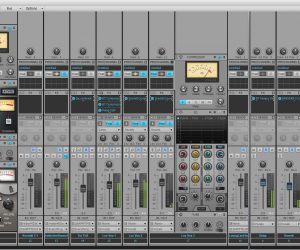
Review: JZ Microphones Black Hole BH1
It may look like something you post letters through, but this black hole is full of surprises.
What do you get when you take a microphone designer whose other area of expertise is customising jewellery, a support team of Latvian technological daredevils, a healthy development budget and a cutting-edge production facility that’s setup in a place called Scruples? Well, the answer it seems is the JZ Black Hole microphone. No chipping mics off the same old Neumann block for these northern gents; this team boasts new ideas by the truckload and they’re not afraid to deliver a bunch of them in one diminutive, stylish package.
The letters ‘JZ’, by the way, are the initials of the highly regarded head designer of JZ Microphones, Juris Zarins. The company itself has been around since 2007 and shares its Latvian background with two other groundbreaking microphone companies: Blue Microphones and Violet Microphones (the Latvians clearly like their colours as well as their technological challenges). Like any self-respecting Black Hole this microphone has a lot of unusual features to explore so let’s make like an interstellar particle, start on the outside and let gravity take us in.
EVENT HORIZON
The Black Hole BH1 is a medium-sized dual-diaphragm condenser microphone (kind of like an elongated AKG C-414) that’s distinguished by a rather large rectangular hole in the centre of the body. According to the development team, this unusual letterbox-styled opening is designed to reduce body resonances but the cunning Latvians have taken this idea several steps further. Not only does the space conceal a polar pattern switch on the inside (facilitating omni, cardioid and figure-8 patterns), it also forms the basis of a unique suspension mounting system involving a simple metal clamp and the damping qualities of five small rubber balls. Yes, it might sound ridiculous, but actually the design works very well.
This unusual microphone design makes for a rather svelte body shape that supports a compact capsule housing. Everything on the BH1 is finished in classic matte black and overall the mic exudes a quiet look-at-me confidence. For its size the BH1 is surprisingly light and the mounting arrangement allows for a variety of effective adjustments that facilitate its use in tight positions. But for all its external quirks, it’s inside the Black Hole’s capsule housing that things get really interesting.
Mr Zarins and his team have developed a new technique whereby two identical 27mm electrostatic capsules are placed back-to-back to create the various polar patterns. These capsules also utilise a new variable sputtering technique – the specially mixed alloy is distributed in a particular pattern with some areas receiving more, less or even no coverage to produce a very controlled response. Signal-to-noise ratio is very good (down to 87.5dB – A weighted) and SPL for 0.5% THD is a respectable 134.5dB, allowing the mic to work with fairly loud sources despite the absence of a pad switch. Once you get your head around the suspension mount, the XLR cable plugs in somewhat miraculously underneath with a satisfying click and it’s time to make some noise.
NEED TO KNOW
BLACK CARPET RIDE
If I had to describe the JZ Black Hole’s sound in a couple of words I’d say: detailed and smooth. I absolutely loved it on acoustic guitar where it reproduced every nuance of string and wood in a beautifully accurate way. Similarly on vocals it delivered a very life-like tone with minimal artefacts and a nicely controlled proximity effect up close. Violins and percussion came out with plenty of crisp detail and solid midrange making it a great overdubbing mic. Drum overheads were another one of its strong points; in omni mode the Black Hole captured a very true description of my recording space.
But where many ‘accurate’ mics have the tendency to veer off onto the clinical and unforgiving side of the recording spectrum, the BH1 navigates a steady course across this perilous knife-edge. Its detail and veracity are very musical and full of life – I read a US review of the Black Hole that described it as having something of the Neumann U87’s flavour about it and I tend to agree. It certainly does an all-round job on vocals and instruments with similar quality results to the U87 and shares elements of that mic’s tonal balance, being perhaps more detailed and crisp than thick and creamy. The Black Hole, however, is very much its own microphone. Although the price-tag is certainly going to keep some folks away, those that dare to pass beyond the event horizon of the Black Hole BH1 will be richly rewarded with a premium quality, cutting-edge microphone that’s a real studio workhorse and can keep the techies talking for hours. To quote the excellently quirky English of the Black Hole’s brochure: ‘Believe us, sound can be glorious, record it!’

















RESPONSES